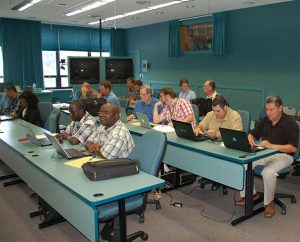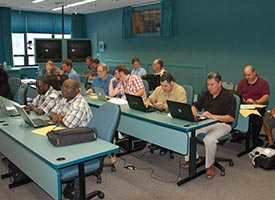Concordia Seminary, St. Louis, is one of 10 Christian seminaries in the country selected for the American Association for the Advancement of Science (AAAS) “Science for Seminaries” program.

The intent of the program — with the seminary receiving a $93,600 AAAS grant for its part in it — is to “help prepare pastors and other church leaders for well-informed thinking and conversations about science,” according to an Oct. 27 Concordia, St. Louis, news release.
To implement the program, “the seminary will launch a two-year initiative to integrate science into the curricula for two core theological courses and support ongoing learning so future pastors are better prepared to counsel and guide congregants and the community when questions arise,” the release continues.
“Pastors are very important for overcoming false impressions and misunderstandings about both the Christian faith and modern science,” said the Rev. Dr. Joel Okamoto, associate professor of Systematic Theology at the seminary and contact person for the project. “This program gives Concordia Seminary a very fine opportunity to help pastors present and future to do this faithfully and fairly.”
The AAAS grant will cover the cost of faculty, resources, guest speakers, campus events and other opportunities for the seminary to “promote the relevance of science to seminary training for two years,” according to the news release.
The seminary’s two courses for which the grant will be used are “Psalms in Writing,” taught by the Rev. Dr. Timothy Saleska, and “Pastoral Theology,” a final-year course with the Rev. Dr. Robert Weise. Saleska is an associate professor of Exegetical Theology and Weise is a professor emeritus of Practical Theology at Concordia Seminary.
“These opportunities provide avenues to introduce students to the assumptions, theories and findings of disciplines like astronomy and neuroscience, and then to reflect on what they might mean for preaching the Word, teaching the faith and giving counsel and guidance to congregants and the community about some of the questions and challenges that contemporary science will bring their way,” Okamoto told Reporter.
He said the “revised courses” will be taught starting next spring, and that the first campus events in the program will likely take place later in 2015.
“Concordia Seminary has long been active in engaging and also seeking to help others engage science from a theological standpoint,” Okamoto said.
For example, he mentioned the seminary’s endowed chair in Pastoral Ministry and the Life Sciences, which Weise has held since 1992, and its 2009 Theological Symposium on “Science and Theology.”
“We saw the ‘Science for Seminaries’ program as a good opportunity to try additional ways for engaging science as Christians,” Okamoto added.
He said that the seminary learned of the program through an announcement from the AAAS, working with the Association of Theological Schools — through which both the St. Louis seminary and Concordia Theological Seminary, Fort Wayne, Ind., are accredited.
“We submitted a proposal, and in the end it was granted,” Okamoto said.
He emphasized that the Science for Seminaries program “does not require the seminary to reconsider or compromise our church body’s theological position. … As in all of our instruction and programs, we are committed fully to teaching and witness that is faithful to Jesus Christ the Lord, and to honor the Synod’s positions in doctrine and practice.”
Although the seminary disagrees with the AAAS position on topics such as evolution, “we can agree that it is good to help pastors and other church leaders deal with these questions fairly and carefully,” Okamoto said.
“And we’re confident that this is something that many people in LCMS congregations want: pastors who speak thoughtfully about science and technology and give informed guidance for our lives, just as they would want pastors to speak thoughtfully and give informed guidance about families, politics, economics, education and the arts.”
Posted Dec. 1, 2014
